13 Crucial Vitamins & Minerals for Horses in All Life Stages
January 03, 2024
13 Crucial Vitamins & Minerals for Horses in All Life Stages
Is your horse getting the VIP treatment when it comes to nutrition? We all want to provide our horses with the best nourishment. Yet often they still face mineral and vitamin deficits that can throw them off track. The potential unwanted health challenges that may arise can leave us wondering what our equine partners might be missing.
So, what causes deficiencies, and how can you ensure your horse gets the balanced diet it needs? In this blog, we explore common nutrient gaps horses experience, related symptoms, and practical solutions to resolve them. But before diving in, let’s get to know exactly what nutrients are and how horses obtain their daily store.
Quick Content Guide
- 7 common reasons horses experience nutrient deficiencies
- Learn which vitamins and minerals horses become low in
- Get the basics of building a nutritious feed plan
- Suggestions on how to choose a horse mineral supplement
- Explore whether Daily Red Fortified is right for your horse
What Nutrients Do Horses Need?
Nutrients are the lifeblood of health! They provide energy, the building blocks for growth and repair, and help regulate chemical processes. They also fuel critical functions like electrolyte balance, nerve conduction, and muscle contraction—processes that help your ride with your horse go smoothly.
Horses require six main classes of nutrients:
- Water
- Fats
- Carbohydrates
- Protein
- Vitamins
- Minerals
Here, we'll focus on minerals and vitamins, unraveling how imbalances can impact our equine friends. But first, let's uncover the root causes of nutritional deficiencies and diseases in horses.
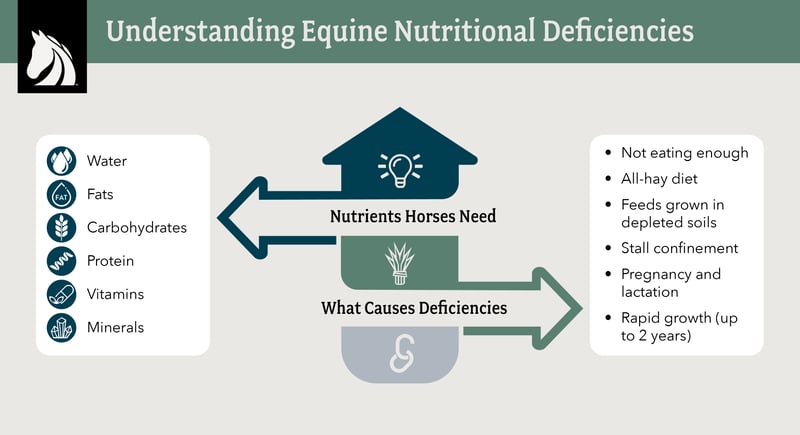
What Causes Deficiencies in Horses?
In a free-roaming environment, horses obtain most of their nutrients by foraging diverse green grasses and plants. They pick up additional minerals through water and by munching bits of soil clinging to leaves and roots.
But what about modern-day horses? What restrictions impact their ability to consume a nutrient dense diet? Let’s explore six of the most common risk factors.
- Caloric deficiency. Insufficient calorie intake—in other words, simply not eating enough—is the most obvious way horses may lack nutrients.
- All-hay diet. First, make no mistake, hay provides many essential nutrients. And it satisfies horses’ near constant urge to chew. But because it’s dried, even high-quality hay may not provide all the nutrients horses need—especially in high-performance or growing horses.
- Deficient soil. Intensive farming practices have left many soils depleted of life-giving nutrients. That means crops grown in these soils, and that we feed our animals, are also lacking. Pastures may also become overgrazed and depleted in vital mineral reserves.
- Stall confinement. Horses spend a lot of time in trailers, stalls, and paddocks. Many are limited to the feeds we bring them, and most are confined to relatively small fields and limited sun exposure when they are allowed turnout. This affects access to diverse nutrients.
- Intense sweating. Some equine athletes work extremely hard, losing up to 3 to 4.75 gallons of sweat with intense exercise. That’s a lot of sweat containing loads of critical minerals and electrolytes that must be replenished.
- Pregnancy. A broodmare’s dietary needs change during and after pregnancy, requiring more nutrients to support a fast-growing fetus and then nursing foal.
- Foals, weanlings, and yearlings. From birth to age two, a young horse can put on as many as 3 pounds per day (AAEP). They require dense nutrients and plenty of balanced feed during this stage to avoid deficiencies.
Vitamin and Mineral Deficiencies to Watch for in Horses
Minerals and vitamins are the tiny-but-mighty powerhouses that keep our horses running smoothly. They are critical components of nutrition and the building blocks of life!
The Merck Vet Manual sheds light on common minerals/vitamins horses often run low on. The symptoms horses may show when deficient are outlined below.
Most Common Mineral Deficiencies
- Calcium: Horses fed large amounts of grain-based concentrates, wheat bran, or excess phosphorus may develop calcium deficiency. (OSU notes two parts calcium to one part phosphorus is ideal for most horses.) Symptoms include swelling/softening of the facial bones, lameness, poor wound healing, and bone weakness.
- Phosphorus: Horses with higher needs—like those growing, lactating, or performing—are more prone to phosphorus deficiency. Symptoms include muscle weakness, trembling, lameness, and pica.
- Copper: Some aged horses experience decreased copper absorption. Insufficient diet can also put growing foals at risk. Symptoms of copper deficiency in horses include a dull coat, poor hoof, and weak ligaments and tendons.
- Salt: Horses often develop salt deficiency if worked hard in hot weather or fed salt-deficient rations. Symptoms include tiring easily, not sweating, dehydration, muscle spasms, decreased milk production in lactating mares, and weight loss or pica in chronic cases.
- Selenium: Forage and crops grown in selenium-deficient soils are a main cause of deficiency. Symptoms of selenium deficiency in horses include white muscle disease and rhabdomyolysis (tying up).
Less Common Mineral Deficiencies
- Potassium: Temporary potassium deficits often occur because of sweat loss—especially in performance horses. Symptoms include muscle weakness, tremors, fatigue, and exercise intolerance. Slowed growth and/or weight loss may also present in chronic cases.
- Magnesium: Stress, sweat loss, lactation, and/or diarrhea can all contribute to magnesium deficiency. Symptoms of magnesium deficiency include nervousness, excitability, or muscle tremors.
- Zinc: Deficiency in horses can occur with intense sweat loss or because of too much dietary iron. Symptoms include weight loss, skin abnormalities, hair loss, and reduced growth rate in foals.
- Iron: This is one of the least common mineral deficiencies. Deficits may be caused by parasitic infection or chronic blood loss. Symptoms include low energy, decreased appetite, fast heart rate, and horse anemia.
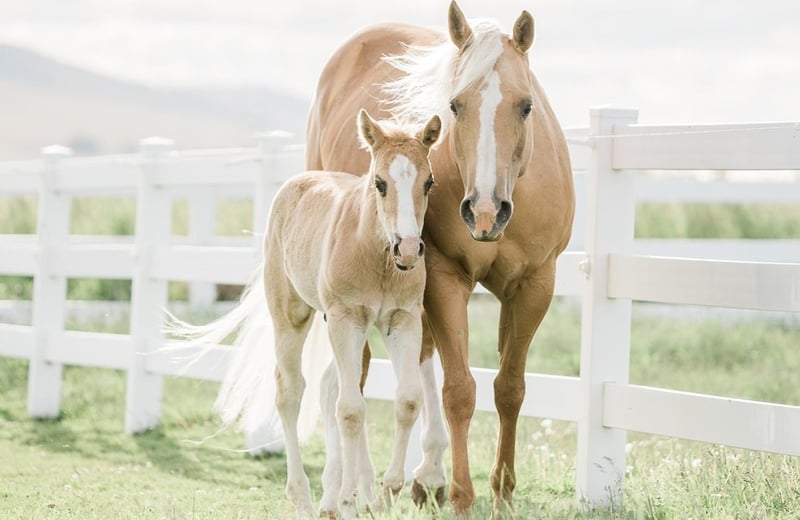
Most Common Vitamin Deficiencies
- Vitamin E: This nutrient quickly loses efficacy in stored hays and commercial feeds. Symptoms of vitamin E deficiency in horses include muscle weakness, tying up, impaired immune function, reproductive failure, and neuromuscular disorders.
- Vitamin A: Vitamin A also decreases in concentration over time. Symptoms of vitamin A deficiency in horses include night blindness, watery eyes, bone and muscle growth defects, a dull coat, and reproductive problems.
Less Common Vitamin Deficiencies
- Vitamin D: Low levels of the “sunshine vitamin” usually affect stalled horses and those with limited access to sun-cured hay. Symptoms include reduced bone calcification, stiff and swollen joints, stiff gait, and irritability.
- Vitamin B1 (thiamine): Eating bracken fern—a plant poisonous to livestock—is the biggest cause of deficiency. Symptoms include weight loss, incoordination, fatigue, and irregular heart rate.
You now know what minerals and vitamins horses often become low in. Now let’s cover how to ensure your horse receives the nutrients necessary to thrive and live a happy life.
Closing the Nutritional Gap
As you know, horses have varying nutritional needs based on age, growth phase, and activity level. So, collaborate with your vet or equine nutritionist when planning your horse's diet. Together, you can create a balanced plan that best meets needs. Here’s a foundational strategy to consider as you begin developing a feed plan:
- Start with hay. High-quality hay is a staple in the equine diet. And while it won’t meet all the dietary requirements of growing or high-performance horses, it may provide adequate protein and energy for less active adult horses (AAEP). Consider testing your hay at a forage lab to determine percentages of fiber, energy and minerals.
- Supplement hay ration with grains/concentrates if necessary. Consult an expert to determine specific grains and ratios.
- Offer diverse pasture for grazing when possible.
- Provide a balanced mineral supplement.
How to Choose the Best Vitamin & Mineral Supplement for Horses
Proper mineral nutrition is vital to achieving a healthy horse. Yet not all supplements are created equal! When browsing, avoid picking individual minerals off the shelf and serving them a la carte—or choosing too many supplements. Oklahoma State University explains why:
“When creating diets for horses, it is important to consider not only how much mineral is in the diet, but also the ratio of particular minerals in relationship to others. Minerals have very complex interactions with each other, and excesses or deficiencies of minerals can greatly affect the absorption, metabolism and excretion of others. Therefore, horse owners who “tinker” too much with their horse’s diet through overzealous supplementation may be doing more harm than good for their horse.”
Instead, opt for a quality horse vitamin and mineral supplement with a complete spectrum of nutrients in balanced ratios. The best horse minerals also have chelated, or bioavailable, minerals that are easy to absorb. One such option is Redmond Daily Red Fortified.
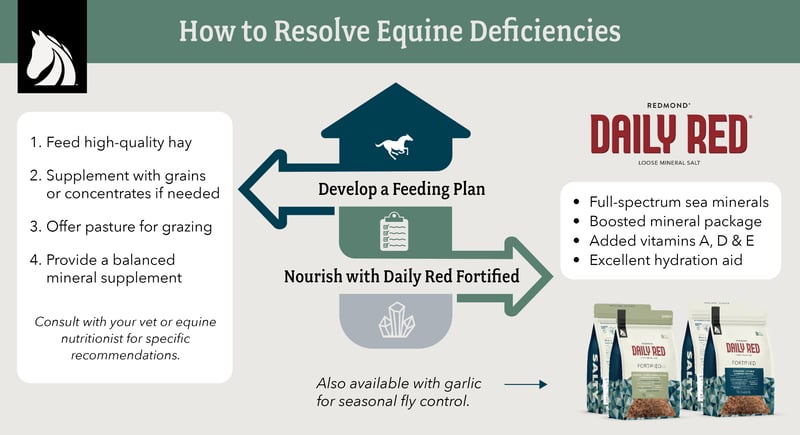
Daily Red Fortified: Balanced Horse Minerals & Vitamins
Daily Red Fortified is a natural choice. It provides pure sea salt and a broad spectrum of loose minerals and vitamins—including 12 of the 13 horses may become deficient in. Fortified offers horses these health benefits:
- Bioavailable Trace Minerals. A full spectrum of balanced trace minerals made by nature and mined in Utah promotes wellness and a vibrant appearance.
- Fortified Mineral Formula. Boosted mineral package of zinc, manganese, copper, iodine, selenium, and cobalt support immunity, reproduction, metabolism, and body condition.
- Vitamins A, D & E. This powerful trio of vitamins (including natural vitamin E) provides antioxidant defense and supports vision, immunity, bone strength, and neuromuscular health.
- Excellent Hydration Aid. Redmond sea salt, the foundation of Daily Red, encourages horses to drink and aids proper fluid balance.
- Available with Garlic. Fortified is also available with bioidentical garlic oil to help fight pesky insects in spring and summer.
Daily Red Fortified can play a critical role in providing your horse with vital nutrients it may be lacking. With Redmond, you’ll feel confident you’re getting the best source of essential vitamins and minerals for your horses. Click below to nourish with Daily Red today.
Learn More
- Wondering why your horse is eating dirt? It could be a sign of mineral deficiency or one of these other four causes of dirt eating.
- We have a horse mineral salt to suit every season. Learn about switching to a fly control mineral during spring and summer.
© Redmond Equine 2024. All rights reserved.
Related posts
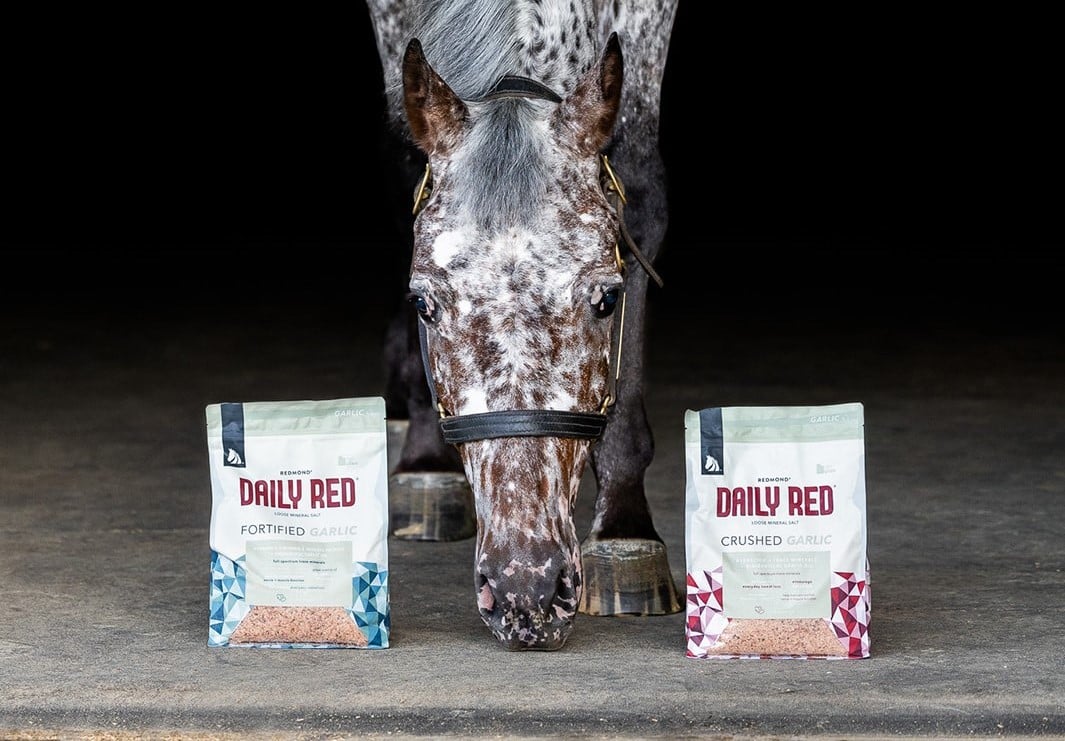
Redmond Daily Red: Crushed vs Fortified Loose Horse Minerals
Daily Red Crushed and Fortified loose mineral salt supplements help hydrate, balance, and nourish horses. Learn which option is best for your equine.
December 18, 2024
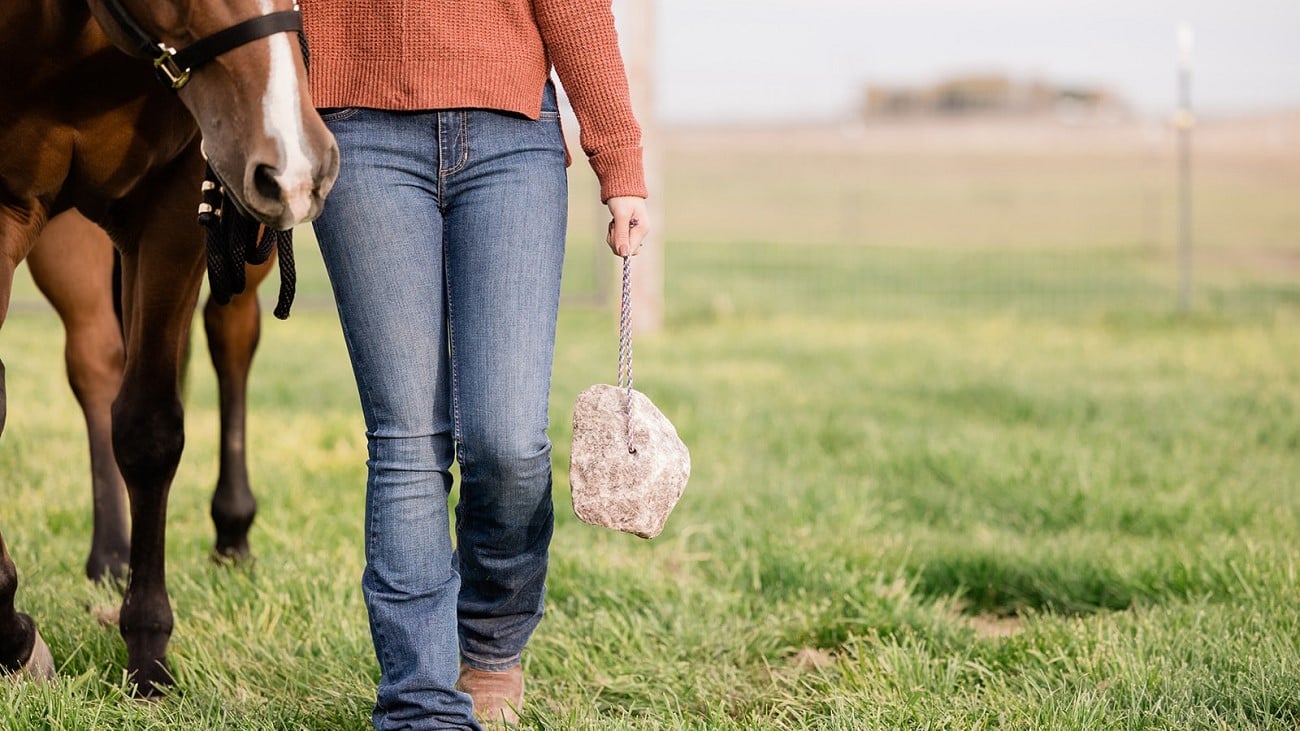
The Seasons Change — So Should Your Horse's Minerals!
A loose mineral salt for horses is needed year-round. Learn which horse mineral to feed each season, including a fly control mineral for horses in...



